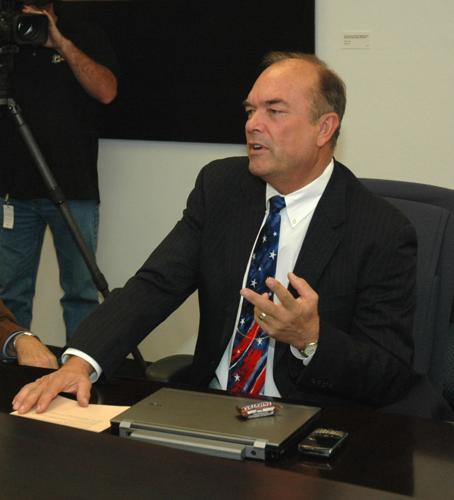PHOENIX — Corporate tax cuts enacted during the recession amid promises they would stimulate business growth will actually leave the state with $350 million less per year by the time they’re fully implemented.
Legislative budget staffers said Arizona collected $663 million last year in corporate income taxes. Had the tax laws stayed the same, even with economic changes, the state still would have brought in $644 million by the 2019 budget year.
But members of the state’s Finance Advisory Committee figure that cuts in the tax rate approved in 2011, coupled with a provision that allows some multi-state corporations to choose an alternate method of computing what they owe, means actual collections that year will be less than $300 million.
The tax cuts were promoted as an incentive to get corporations and their high-paying jobs to move to Arizona.
“That was certainly the hope when they were enacted,” said Sen. Don Shooter, R-Yuma. Shooter told Capitol Media Services the numbers released Wednesday underline what he is now preaching as chairman of the Senate Appropriations Committee.
“Let’s stop tinkering with stuff, including the income side of the equation,” he said.
His remarks come as Gov. Doug Ducey on Wednesday repeated his 2014 campaign promise to lower taxes every year he is governor.
Already draft versions of the budget are circulating with $30 million set aside in tax cuts. But Ducey said exactly who will benefit from those cuts remains to be negotiated.
“I just think we need to calm down a little bit,” Shooter said.
“I know that’s not politically popular, certainly not as much as a tax cut,” he said. “But the fact of the matter is, we’re smart if we’re conservative on both sides of the equation: Do not increase spending a great deal, and do not diminish your revenue.”
And Shooter, with the benefit of hindsight, has a different view on the cuts.
“I wouldn’t have done it,” he said.
But Sen. Debbie Lesko, R-Peoria, who chairs the Senate Finance Committee — and rounded up votes for the 2011 tax cut as House majority whip — said she does not think the move was a mistake.
“In fact, we had economists, if I remember back then, encouraging us to do some of these tax cuts to encourage corporations to come here,” she said.
And Lesko said she believes tax cuts ultimately do stimulate the economy.
“There’s economic development folks throughout this state and in the cities that continue to say … that one of the major reasons that (businesses) decide to move here is that there’s some type of tax advantage over another state,” she said.
That advantage was supposed to come from two big changes in corporate taxes.
The first took the corporate tax rate, which had been 6.97 percent, and dropped it to its current 5.5 percent. And next year it goes to 4.9 percent.
More complex is how multi-state corporations compute what percentage of their income is attributed to — and taxed by — Arizona.
The law uses a formula: Half is based on the share of sales in the state, with the other half divided equally between the amount of property and the size of the payroll.
Under the law being phased in through next year, multi-state corporations could elect an alternate formula based entirely on what percentage of their sales are made in Arizona.
That option makes no sense for retailers. But it provides a major break to companies that manufacture everything from computer chips to missiles where the number of sales within Arizona is small to nonexistent.
Ducey said his negotiations with the Legislature over the budget involve “living within our means.”
“In terms of dramatically increasing spending, that’s not going to happen,” he said. And the governor made it clear he intends to demand another tax cut this year, just as he vowed when running for office to do every year.
“I really believe that whenever we can make our state a more attractive place to live, work and do business, we’re doing good for our citizens and for our taxpayers,” Ducey said. “It’s a commitment that I made, and it’s a commitment I intend to keep.”
Gubernatorial press aide Daniel Scarpinato said his boss is unwilling to simply leave tax rates where they are. “Economic development is dynamic,” he said.
“We’re competing with 49 other states,” Scarpinato said. “Every state is looking at ways to be more competitive.”
When it comes to corporate income taxes, Arizona appears to already be there.
The Tax Foundation reports that only five states currently have top corporate tax rates less than Arizona’s 5.5 percent.
Some states, such as Washington, Nevada and Texas, do not have a corporate income tax. But the Tax Foundation says they instead have a “gross receipts tax” that is not directly comparable to income taxes.
And that’s even before the scheduled rate drop next year to 4.9 percent.
Asked if the state can afford another $30 million in tax cuts, Scarpinato said his boss sees no reason why not.
“He was elected talking about the need to reform our tax code and drive down taxes,” Scarpinato said of the governor. Anyway, he said, phrasing the question as reducing state revenues is the wrong way to look at it.
“Our concern shouldn’t be with how much money does government have,” Scarpinato said. “It should be with how many jobs do we have, how many citizens are employed, what new growth are we seeing, what new businesses are we attracting.”
State economic officials reported Arizona last month finally has as many people working as it did before the recession. The nation as a whole, which did not see the same level of job losses as Arizona, crossed that line in May 2014.







